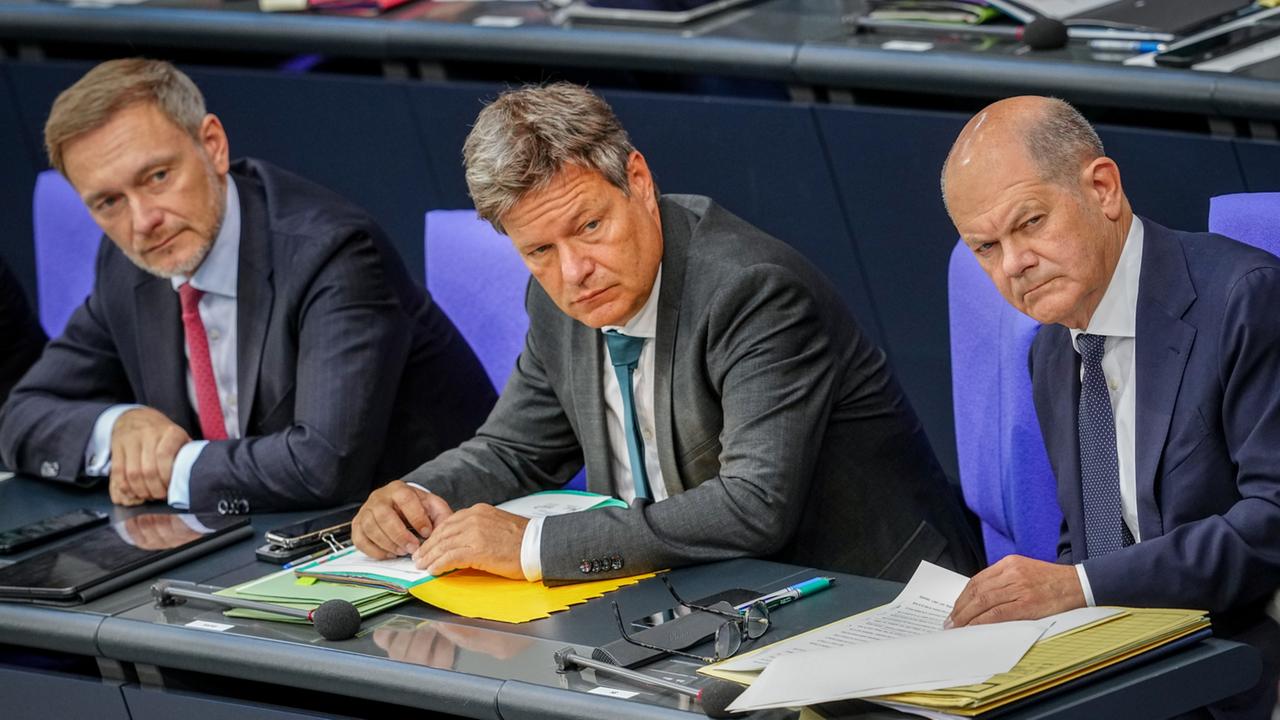analysis
The government misses the deadline for the draft budget, the SPD puts the Chancellor under pressure, young liberals threaten to break the traffic light coalition: What speaks for an end to the traffic light coalition – and what speaks against it.
Finance Minister Christian Lindner reached into his rhetorical bag of tricks in the packed hall of business leaders at the Industry Day: He is from the Rhineland and knows the carnival well – you make yourself popular if you throw a lot of sweets. Unpopular, or even “unpopular”, if you can't throw as many sweets or none at all.
Many of the decisions that the FDP politician is currently preparing together with Chancellor Olaf Scholz and Economics Minister Robert Habeck are likely to be unpopular. A billion-euro hole needs to be plugged in the 2025 budget.
To this end, Lindner, Scholz and Habeck meet again and again in groups of three to go through each item item by item in order to save millions here and billions there. Lindner prefers to talk about reallocation rather than savings.
Lindner is confident – and is met with laughter
At the Industry Day, Lindner appeared confident when asked whether the traffic light coalition could collapse due to the budget negotiations. “I see no indication that we should be concerned about the stability of the government in our country,” said Lindner – his answer was met with laughter in the room.
In fact, the question remains as to how long the traffic light coalition will last. That means uncertainty. And that is poison for the economy, many entrepreneurs agree.
No traffic light party would benefit from the breakup of the coalition
If you look at the poor to disastrous results of the traffic light coalition partners in the European elections, a break in the coalition and subsequent new elections would not be a good solution for the three parties. This would mean that they would lose even more trust among voters rather than possibly emerging as winners.
“Our damn job as a government is to solve problems together, even in difficult times,” ranted Green Foreign Minister Annalena Baerbock in the Bundestag in mid-June. The corona crisis, the Russian war of aggression in Ukraine, the Gaza conflict – in view of these crises, do we now want to fail because of budget negotiations?
The situation is actually too serious, the enemies of democracy are on the rise, to end this coalition with a big bang, is what we hear from the coalition. People fear that control will be lost.
Lindner must deliver and draw up a budget
Democracy must therefore deliver, says FDP leader Linder at the Industry Day. He must deliver and draw up a budget. If he does not do that, it could damage the Liberals so much that they will no longer be part of a government in the event of new elections. With poll ratings of around five percent, they may have to fear for re-entry into the Bundestag.
The SPD would lose even more of the voters' trust in its ability to solve problems. According to surveys, the Social Democrats are already no longer trusted to do much in this area. Even the Greens, who are becoming increasingly quiet in the budget dispute, cannot have any interest in breaking up the coalition after the results of the European elections.
The handling of the debt brake divides
On the other hand, it looks as though, when it comes to the budget, two trains are rolling towards each other from opposite directions without stopping. And this is mainly related to the keyword debt brake.
Finance Minister Lindner and the FDP have become isolated on this point. Not only the SPD and the Greens, but also many economists and business representatives are now calling for more debt to be taken on than is currently planned.
Some are calling for a new “special fund” to invest billions in infrastructure. Others are demanding that politicians declare a new emergency in connection with the spending on Ukraine, which would allow for higher new debt according to the constitution. There is no other way to plug the billion-dollar hole in the budget.
Djir-Sarai speaks of “Debt populism”
This is the argument of the SPD in particular. In order to underline the demand for an exception to the debt rule, the various party wings have joined forces and are now railing against the “dogma of the black zero” – and thus indirectly against the FDP.
SPD leader Saskia Esken puts it this way: “It is quite clear that we as the SPD are not prepared to allow our solidarity with Ukraine to be pitted against the continued existence of our solidarity with our own people.”
The FDP is so outraged precisely because this shows that the SPD wants to take on new debts for social spending rather than investments. General Secretary Bijan Djir-Sarai speaks of “debt populism by the SPD.”
Frustration among the young members of the FDP faction
Younger MPs around Jens Teutrine say: “Without a debt brake, without us,” threatening to break the traffic light coalition. They are also quite self-confident: “The debt brake will not be suspended either way: Either we agree on this again in the coalition, or the coalition will no longer exist,” says 28-year-old Max Mordhorst.
Frustration has built up, particularly among the young members of the FDP faction: They resent party leader Lindner for voting yes to the government's pension package, which includes the FDP's wish for a share pension – in a watered-down version – but also an expensive pension guarantee. In this respect, the comments from both the FDP and the SPD are likely to be directed not only at the other coalition partners, but also at their own top politicians, namely Finance Minister Lindner and Chancellor Scholz.
Scholz: “Make do with the money we have”
Both continue to act as mediators: Lindner speaks of “solution-oriented” talks on the budget and economic turnaround, Scholz emphasizes in ARD summer interview: “We have to make do with the money we have. There's no way around it.”
It may be that the two of them, together with Vice Chancellor Habeck, could still agree on a draft budget. They are also giving themselves more time to do so – the budget decision will probably not be made by the cabinet until July 17, not July 3 as originally planned.
“Quality comes before speed,” is the message from the Chancellery. But even then it is highly uncertain whether the factions will go along with their diametrically opposed positions. At least: The coalition would have saved itself for a few months, until the budget discussions in the Bundestag.






